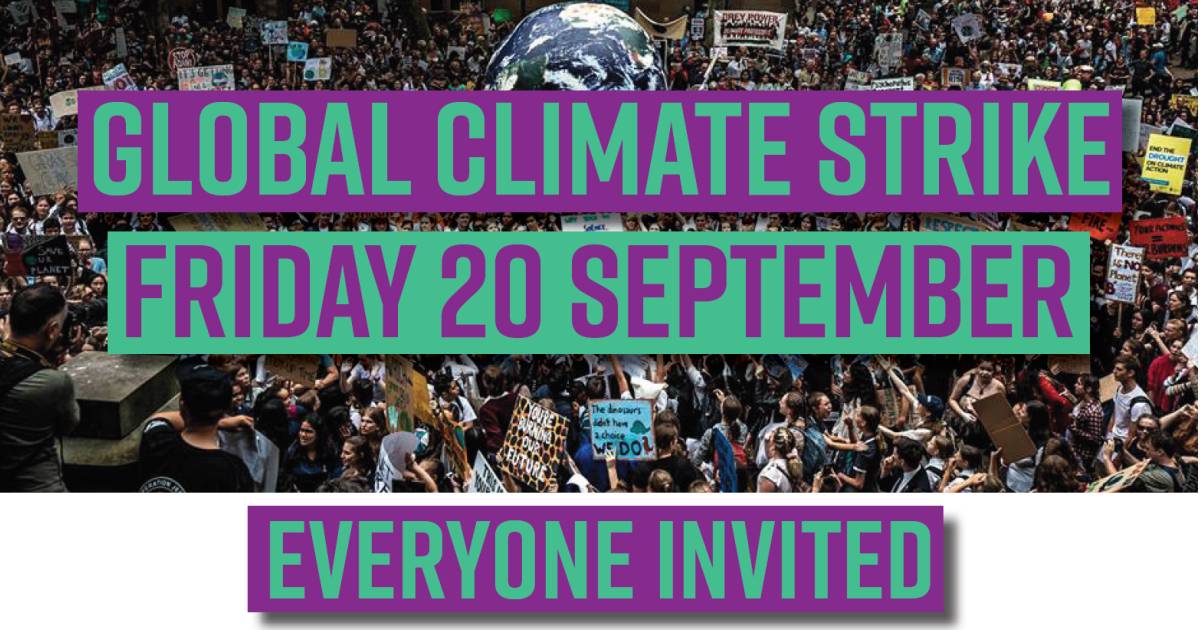
Tomorrow marks the start of climate protests across the planet on a scale that is likely to be the largest the world has ever seen.
School strikers are aiming to make September 20 protests against fossil fuels and in support of climate justice their biggest yet, and millions of adults are expected to join in. The date is significant – just a few days before a UN climate action summit being held in New York; the one Australian Prime Minister Scott Morrison won’t be attending ( even though apparently he’ll be in the U.S.).
“By taking time off school and work together around the world, we’ll show our politicians that people everywhere want climate justice and we’re not going away until we get it,” says the Australian SchoolStrike4Climate web site. “We’ll strike in solidarity for everyone who’s already being hurt by the climate crisis and everyone who will be impacted if we don’t act now: workers, first nations people, young people, mining communities and more.”
Not Business As Usual
Part of the action is Not Business As Usual, a group of businesses and organisations supporting worker participation in the climate strike. The organiser is Australian superannuation fund Future Super, which is closing its doors for the day. As at last night, 1,878 businesses and organisations in Australia and across the world had joined the alliance.
Some Australian governments have also signalled their support of the action. Among them is Victoria’s Andrews Labor government, which reportedly gave permission for public servants to stop work to join a climate rally in Melbourne’s CBD.
As for the Federal Government, well, Prime Minister Morrison recently warned businesses about “distractions“. He didn’t mention the climate change debate specifically, perhaps learning something after the backlash when he admonished student strikers back in November last year.
However, it seems Australians do want businesses to get involved. A CEDA nationwide poll published this week states more than three-quarters of survey respondents supported business leaders speaking out on social and environmental issues.
Finding A Climate Strike Event
Lists of events on Friday are available on the GlobalClimateStrike and SchoolStrike4Climate web sites – and there looks to be bunch organised in Australia.
“Together, we will sound the alarm and show our politicians that business as usual is no longer an option,” says GlobalClimateStrike. “The climate crisis won’t wait, so neither will we.”
The impact on productivity on Friday will have a financial cost – but it pales in comparison to the financial, environmental and human costs of climate change.

 RSS - Posts
RSS - Posts



It doesn’t seem to have received much publicity in Australia, but there is an international business group named ‘ClimateAction100’ which aims to convince the world’s 100 largest corporations to take positive climate action.
Here’s the blurb from the website:
Climate Action 100+ is an investor initiative launched in 2017 to ensure the world’s largest corporate greenhouse gas emitters take necessary action on climate change. More than 360 investors with over $34 trillion in assets collectively under management are engaging companies to:
Curb emissions
Improve governance and
Strengthen climate-related financial disclosures.
Organizations such as the above are increasing the pressure world-wide on governments and business to do more, and their overall ‘clout’ is now significant eg.
https://climateaction100.wordpress.com/news-and-events-2/
It sends a huge message to large companies, when institutional investor companies tell them something along the lines of ‘(a) we aren’t going to make any additional investments in your company from now on, so forget about us contributing to any new share issues or capital raisings you make in the future – and (b) – so far as our existing holdings are concerned – some of which have been held for decades – we’ll be selling those off progressively as the opportunities arise too.’
Meanwhile… ‘Scomo’ will no doubt happily bask in being made to feel important by ‘The Donald’. He may even return triumphantly displaying a gold tie pin, embossed with the words’ ”I am Donald’s only friend’ and an almost pure silver miniature model of an SMR nuclear reactor tucked away in his luggage, to keep as enduring memories of his visit.
I notice that ExxonMobil intends selling…
‘ALL of its oil and gas assets in the Gippsland Basin, off Victoria’s south east coast. The sale includes offshore oil and gas platforms, the Longford gas plants and the Long Island Point plant near Hastings.’
… according to this news item at: https://www.abc.net.au/news/2019-09-18/exxonmobil-sells-off-gas-and-oil-assets-in-south-east-victoria/11524416
On checking the ExxonMobil Australian website, it seems that THEY base their planning on a 2 degree C rise, not the lesser 1.5, and of course not the 0 degree rise implied by others. See their webpage here:
https://www.exxonmobil.com.au/Energy-and-environment/Energy-resources/Outlook-for-Energy/Pursuing-a-2C-pathway#seekingPracticalSolutions
Des Scahill,
You state:
“I notice that ExxonMobil intends selling…”
But will there be buyers? Will there still be mugs willing to buy what will likely become “stranded assets” in future?
Also, you state:
“On checking the ExxonMobil Australian website, it seems that THEY base their planning on a 2 degree C rise, not the lesser 1.5, and of course not the 0 degree rise implied by others.”
IMO, it’s pointless planning for 1.5°C rise – it’s already ‘locked-in’ and it will likely arrive by around 2030. And 2°C rise is likely by about 2050 if humanity continues business-as-usual.
See: http://www.climatecodered.org/2019/08/at-4c-of-warming-would-billion-people.html
The link above includes an embedded YouTube video of an interview (reportedly early Aug) between the host of BBC HARDtalk, Stephen Sackur, and Extinction Rebellion co-founder Roger Hallam, which has prompted some social media responses.
Some comments by Hallam that I think are poignant are:
From time interval 15:11:
“If grannies turn up to a meeting, are being in tears about what’s happening to their grandchildren, it’s not… it’s not what I’m doing that makes them sit down on the road. It’s the same with teenagers. Teenagers are shitting themselves about what’s happening for the future. They’ve got another fifty, sixty, seventy years to live on this planet. By that time there could only be a billion people left. I mean, that’s six billion people that have died from mass starvation or slaughtered in war. I mean, the scale of it is beyond the imagination, isn’t it? And this is… this is the biggest problem, is the elites, and the BBC, and the conventional media, has simply not grasped the enormity of what’s happening.”
IMO, there’re no pulling of punches by Hallam – confronting stuff! Des, would you disagree with Hallam’s analysis? Or this, from time interval 18:57:
“If the elites don’t respond to non-violent action, then you know what’s going to come next – is people other than Extinction Rebellion, will use violence – that’s what’s coming down the road. I mean, I’m speaking as a sociologist here. I’m not saying it’s good or bad. What I’m saying is: If you put a society under a massive, enorm… a massive amount of stress, if you’ve proposed… Just leave me a moment… Just let me finish this. If you let… if you tell the citizens of country, that the government is facilitating their death, then you can expect one thing, particularly in a country like Britain where people don’t put up with such nonsense, you… you can expect rebellion.”
On July 23, BHP’s chief executive Andrew Mackenzie delivered a speech in London that included this statement:
“As we have seen from activism and debates from schools to parliaments all around the world, we see this period as an escalation towards a crisis.”
See: https://www.bhp.com/media-and-insights/reports-and-presentations/2019/07/evolving-our-approach-to-climate-change
So, are some of the elites starting to take notice? Will an adequate response follow from BHP’s observation earlier this year?
Roger Hallam suggests that in many countries a critical mass of angry people has not been reached yet but he expects it will build quickly, shocking governments and the media. He said (from time interval 22:00):
“A critical mass of people are starting to realise what’s going on, which is the elites and the governments aren’t actually going to do anything. They are not going to fulfil their primary responsibility, which is to look after the people. And it will happen quickly.”
Look at what has happened in Syria, Egypt, Libya, etc. Governments were apparently not looking after many people there, so that led to rebellions and mass civil disobedience.
Ian Dunlop and David Spratt’s op-ed in The Guardian, published Aug 3, concluded with:
“The government’s role should be to protect the future from the past, not the past from the future. When government refuses to lead, others must.”
See: https://www.theguardian.com/commentisfree/2019/aug/03/australias-climate-stance-is-inflicting-criminal-damage-on-humanity
Perhaps a trigger event may prompt a rethink?
Escalating water shortages may be a catalyst. Water catchment storage levels for cities like Darwin, Brisbane, Sydney and Melbourne’s are all down from previous years.
See: http://www.bom.gov.au/water/dashboards/#/water-storages/summary/state
The current drought in the Australian eastern states is apparently the worst on record – worse than the Millennium drought, WW2 drought – increasing the risk of major wildfires this summer. Drought may also begin to impact on basic food supplies and raise prices, increasing stresses on poorer households.
And per AEMO, Victoria is at risk this summer for major power blackouts.
And new marine rules are set to boost diesel fuel prices from October, likely impacting on whole economies because diesel is a critical transport fuel.
Perhaps a disruption to Australia’s liquid fuel supplies due to escalating tensions significantly restricting oil supplies through the Strait of Hormuz?
More people may perhaps begin to gain the perception that governments have not been looking after their best interests. But will it be too late to turn the ‘ship of state’ around?